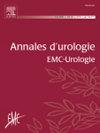Difficult clinical cases in prostate cancer: multidisciplinary staff, the rational principles of adjuvant therapy and other therapeutic options
Abstract
Difficult clinical cases of locally advanced prostate cancer at high-risk of progression should be discussed during a collegial decision-making process with different clinical specialists (surgeon, radiotherapist, oncologist, chemotherapist). Scientific consensus exists to give an adjuvant therapy after initial curative local treatment in patients with unfavourable prognostic features. For patients with locally advanced prostate cancer extending beyond the capsule (pT3) or with positive surgical margins, studies have shown that immediate postoperative radiotherapy is to eradicate the microscopic disease left in the surgical bed. Studies have shown the potential benefit of cytotoxic chemotherapy in terms of overall survival and median time to progression in patients with metastatic hormone-refractory prostate cancer. Active clinical research is underway to study neoadjuvant systemic chemotherapy before radical prostatectomy. There are also currently several clinical trials that are investigating the addition of chemotherapy in patients at high-risk of progression in the postprostatectomy setting. Antiandrogen therapy after radical prostatectomy has been shown in randomised studies to significantly reduce the risk of objective clinical progression in patients with high-risk localized prostate cancer. Immediate hormonal therapy with bicalutamide is a valuable therapeutic option in men having prostate cancer with such clinicopathological features.

 求助内容:
求助内容: 应助结果提醒方式:
应助结果提醒方式:


